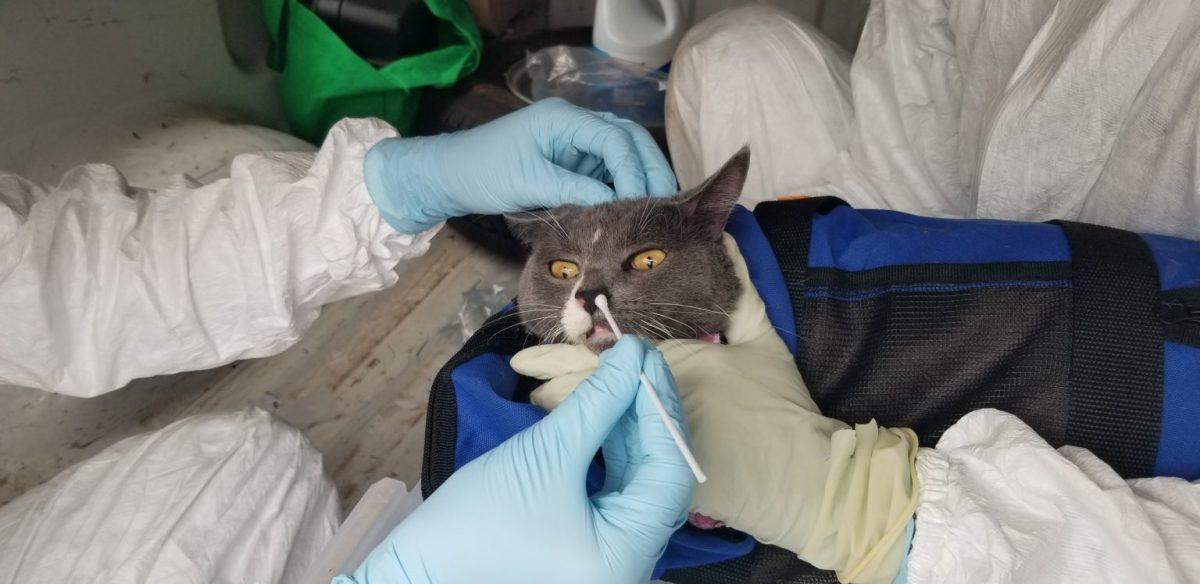Beginning in March, a Texas A&M research team has been conducting a study to test pets for SARS-CoV-2, the virus that causes COVID-19, in households where owners have tested positive for coronavirus.
Associate professor in the College of Veterinary Medicine and Biomedical Sciences Dr. Sarah Hamer is currently leading a team of researchers to study “high-risk” households in Brazos County where one or more members have tested positive for COVID-19. Dr. Hamer said her team has tested pets in these households for SARS-CoV-2, and so far, three cats and one dog have tested positive.
When a person tests positive for COVID-19, Hamer said they receive a questionnaire from the Brazos County Health Department to gather information as part of the normal public health response. Now, Hamer said there has been an additional question asking whether the person who tested positive owns a pet and, if so, if they would like to learn more about her study.
Dr. Hamer said her team’s goal is to learn more about the COVID-19 virus and how it affects pets and the humans who own them.
“In all [the pet] cases, they were asymptomatic at the time that we initially sampled them,” Hamer said. “Two cats later went on to develop some symptoms. One cat was sneezing for a few days, and another cat was reported to be lethargic, but pretty mild. We were able to resample them, and they’re all doing quite well.”
Postdoctoral researcher Italo Zecca said necessary precautions must be taken before going into each contaminated household.
“First and foremost, we want to be careful with ourselves and with the people. We make sure we wear all proper PPE [Personal Protective Equipment],” Zecca said. “We wear full suits that protect us, respirators, boots, you name it, gloves. It was a little intimidating at some points, but knowing that you’re fully covered with your PPE makes you feel safe.”
Zecca said the team is averaging eight to 12 houses a week to receive as many samples as they can. When the team visits a residence, they retrieve samples from all over each pet’s body to gather the correct information.
“We take body swabs, nasal swabs, oral swabs and rectal swabs from the animals.” Zecca said. “For whatever reason, if we can’t do the swab to the extent that we want, we don’t want to stress out the animal. In terms of the blood, it is usually pretty easy on the animal.”
Postdoctoral researcher Christopher Roundy said he performs the lab work involved with the samples of the potentially infected pets, so he can confirm or deny if the animal has tested positive for COVID-19.
Roundy said determining if there is SARS-CoV-2 detected in a sample can take less than one day once he receives the specimen from the field team.
“We take each sample, and we are looking for evidence of the virus that causes COVID-19, or SARS-CoV-2 is the name of the virus,” Roundy said. “There are other coronaviruses that may infect animals, so we also have steps to make sure that we aren’t accidentally detecting those instead.”
Associate professor and Dr. Hamer’s husband Gabriel Hamer, who has also been working with this team, said once Roundy can determine whether or not the virus has infected a pet, the sample is sent to another lab to be confirmed.
“We are also getting blood samples and testing for antibodies to identify if this animal has been previously exposed,” Gabriel said. “The public health message with this is that it is possible for the virus to be transmitted from a human to a companion animal.”
Gabriel said the research has shown that cats specifically seem to be more likely to contract the virus compared to dogs.
“Most of the animals sampled so far are dogs,” Gabriel said. “A lesser number of cats have been sampled. Not only our work, but some experimental challenge studies where there are infected animals in the labs, so far, does look like cats are more susceptible to SARS-CoV-2 than dogs.”
Gabriel, along with the entire research team, said that there is no reason to be worried about getting COVID-19 from your pet. There has been no evidence so far to suggest animal-to-human transmission, but the team is continuing to study the risk of this occurring.
“Right now, there is no reason for pet owners to be concerned where they don’t want to get COVID-19, so they are going to surrender their animals,” Hamer said. “That would not be justified with the current science or information that is available about the risk.”
A&M study identifies positive COVID-19 cases in cats
August 18, 2020
Photo by Courtesy of Texas A&M College of Veterinary Medicine & Biomedical Sciences
Cats with COVID19
Donate to The Battalion
Your donation will support the student journalists of Texas A&M University - College Station. Your contribution will allow us to purchase equipment and cover our annual website hosting costs.




















